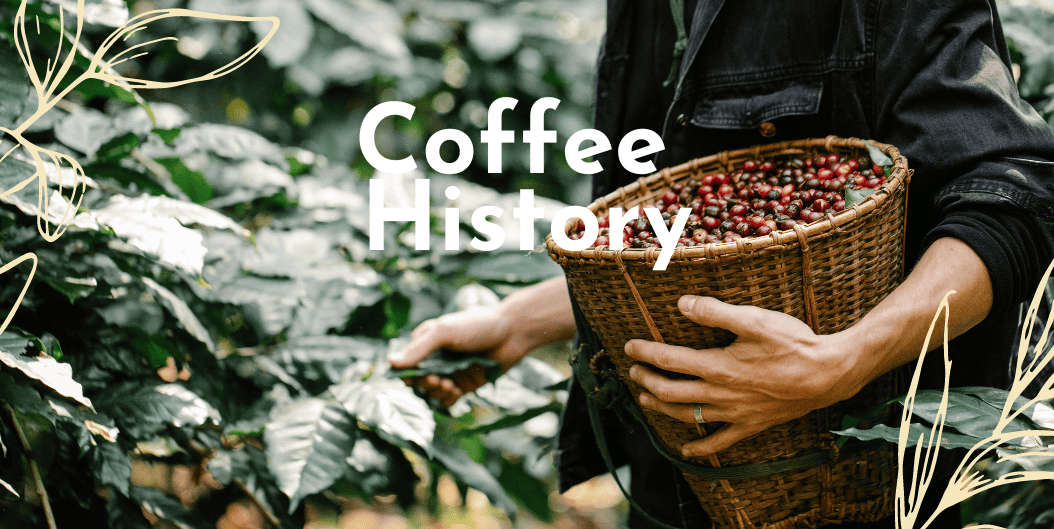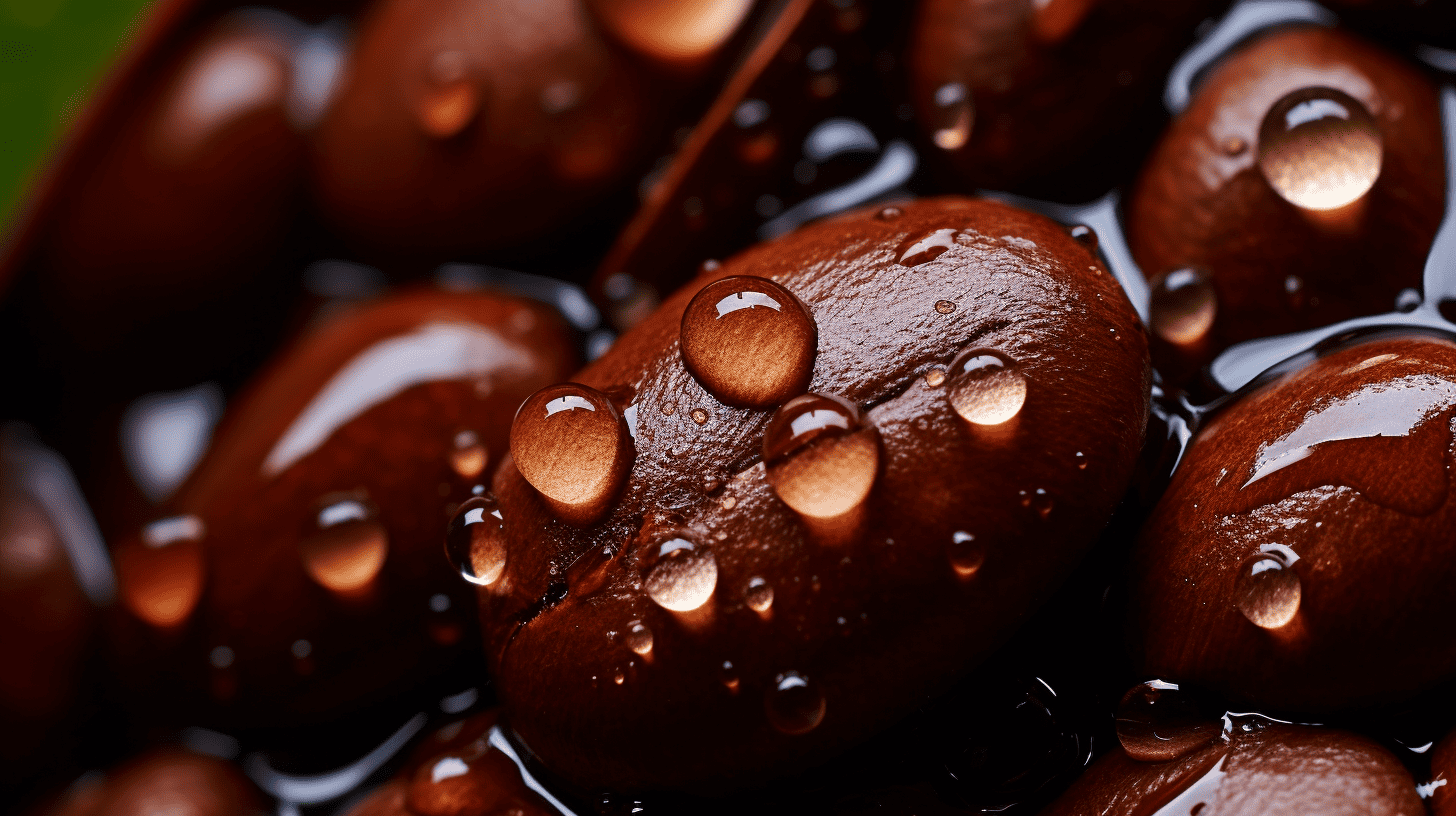From the ancient coffee forests of Ethiopia to bustling New York cafes, coffee history and science has been a staple in human culture for centuries. This energizing drink is more than just a morning pick-me-up; it symbolizes connection and conversation throughout history.
In fact, with over 2.25 billion cups enjoyed each day worldwide, coffee ranks as one of the top three beverages alongside water and tea.
As you sip your favorite brew, join us in exploring the fascinating journey of this beloved beverage – from its humble beginnings on an Ethiopian plateau to the scientific discoveries that have revealed its numerous health benefits – igniting our love affair with this liquid gold.
Key Takeaways
- Coffee originated in Ethiopia and spread throughout the Middle East and Europe, eventually becoming a global commodity through trade routes and colonization efforts.
- Coffeehouses played a crucial role in shaping society during the Age of Enlightenment by providing gathering places for people with shared interests while offering an escape from daily routines.
- The chemical composition of coffee beans offers numerous health benefits, including reducing the risk of cardiovascular disease, type 2 diabetes, and liver disease, improving cognitive function, and increasing metabolism. Additionally, caffeine is a natural stimulant that boosts metabolic rate. Moderation is key to enjoying these benefits without adverse effects on health.
- Arabica and Robusta are the two main species of coffee beans that can be roasted to different levels (light roast, medium roast, dark roast, or espresso), which contribute to distinct flavor profiles creating variety for coffee lovers.
Tracing The Roots Of Coffee: A Journey Through History
Coffee has a rich history, originating in Ethiopia and spreading throughout the Middle East and Europe as a luxury item before becoming a global commodity.
From Ethiopia To The Middle East And Europe
The journey of coffee from Ethiopia to the Middle East and Europe is a fascinating tale highlighting this popular beverage’s global impact and allure.
- Originating in the ancient coffee forests of the Ethiopian plateau, coffee has a rich history that spans centuries.
- According to legend, a goat herder named Kaldi discovered coffee’s energizing effects after observing their impact on his goats.
- From Ethiopia, coffee traveled across the Red Sea to Yemen, where it was first cultivated as a crop.
- As trade routes expanded, merchants transported coffee beans from Yemen to Turkey, where innovative brewing methods were developed.
- Coffee soon transitioned from an exotic luxury item to an increasingly popular beverage within high society and artistic circles throughout the Middle East.
- European travelers brought coffee back with them, leading to its introduction and rapid growth in popularity across Western Europe during the 17th century.
- Establishing coffeehouses in Europe fostered social interactions, intellectual discussions, and political movements.
- With Europe’s colonization efforts came vast expansions in coffee cultivation around the globe – from Indonesia and India to South America and the Caribbean.
- The Columbian Exchange further facilitated the spread of coffee consumption worldwide, becoming one of the three most popular beverages alongside water and tea.
- Today, New Yorkers consume seven times more coffee than residents of other cities – demonstrating how deeply ingrained this refreshing drink is within our global culture.
The Transformation Of Coffee From A Luxury Item To A Global Commodity
Coffee was once considered a luxury item, reserved only for the wealthy. However, coffeehouses started popping up in Europe and America during the 17th century, so it quickly became a popular drink among all classes.
One particular event that contributed to the proliferation of coffee was the Columbian Exchange, which brought new crops from Africa and the Americas to Europe and vice versa.
This led to increased cultivation of coffee across different regions of the world, making it more accessible and affordable for consumers.
The Rise Of Coffeehouses And Their Impact On Society
As coffee began to spread throughout Europe, it quickly became a popular drink among the ruling and artistic classes. In the 17th century, coffeehouses emerged as meeting places for intellectuals, where artists and philosophers could share ideas.
Coffeehouses also played a crucial role in shaping society during the Age of Enlightenment. Many of these establishments attracted innovators who would shape modern thought.
Coffeehouses helped bring people together from all walks of life and fostered a sense of community that transcended social barriers.
The Science Of Coffee: Understanding The Chemistry And Health Benefits
Coffee’s chemical composition, including its high levels of antioxidants and caffeine, offers numerous health benefits, such as lowering the risk of Type 2 diabetes, decreasing the likelihood of liver disease, and improving cognitive function.
Chemical Composition Of Coffee Beans And Their Effects On The Body
As someone who loves coffee, understanding its chemical composition and effects on my body has always fascinated me. Coffee beans contain numerous compounds that can affect the human body, such as caffeine, antioxidants, flavonoids, and chlorogenic acid.
Caffeine is the most well-known compound in coffee and is a stimulant to the central nervous system. It improves alertness, enhances mood, and increases physical performance.
Antioxidants are another essential component of coffee that protect our cells from damage caused by free radicals and oxidative stress linked to certain diseases like cancer or Alzheimer’s disease.
The amount of these beneficial compounds varies depending on how the beans are processed and roasted – dark roast tends to be less bitter than light roast because it has had more exposure time over heat, reducing antioxidant content but raising acrylamide levels (a potential carcinogen).
Health Benefits Of Coffee, Including Reduced Risk Of Certain Diseases
As a coffee lover and expert, I can attest that there are many benefits to drinking this delicious beverage. Here are some of the health benefits of coffee that you should know:
- Reduced risk of cardiovascular disease: Studies have shown that drinking coffee in moderation can reduce the risk of heart disease, stroke, and other cardiovascular issues.
- Lowered risk of type 2 diabetes: Coffee contains compounds that help regulate blood sugar levels, which can reduce the risk of developing type 2 diabetes.
- Improved cognitive function: The caffeine in coffee stimulates the central nervous system, which can help improve focus, memory retention, and overall brain function.
- Reduced risk of liver disease: Coffee has been shown to protect against liver diseases such as cirrhosis and liver cancer.
- Increased metabolism: Caffeine is a natural stimulant that can boost metabolic rate and increase calorie burn.
Of course, it’s important to remember that these benefits are associated with moderate coffee consumption (around one to three cups per day), and excessive caffeine intake can adversely affect health. Additionally, it’s essential to choose high-quality coffee beans from ethical sources to ensure the full potential benefits of this beloved drink.
Caffeine And Its Impact On The Brain And Body
As coffee drinkers, we all know that caffeine is the magic ingredient that gives us a much-needed energy boost to start our day. But what exactly is caffeine, and how does it affect our body? Caffeine is a natural stimulant in coffee beans and other plant-based foods like tea, chocolate, and soft drinks.
When we consume caffeine, it passes through our bloodstream and reaches the brain, blocking the action of adenosine – a chemical promoting sleepiness.
Moreover, caffeine also impacts various bodily functions, including heart rate, blood pressure, and metabolism. Studies have shown that moderate caffeine consumption can reduce the risk of developing diseases like Parkinson’s disease, Alzheimer’s disease, liver cancer, and type 2 diabetes, among others.
However, excessive consumption of caffeine can cause adverse effects such as anxiety jitters or insomnia, particularly in those who are sensitive to its effects.
Types Of Coffee: A World Of Flavor And Variety
Arabica and Robusta beans have unique characteristics that contribute to distinct flavor profiles, while different roasts further enhance these flavors and create specialty drinks using various brewing methods.
The Unique Characteristics Of Arabica And Robusta Beans
Arabica and Robusta are the two main species of coffee beans. Arabica is the most popular, accounting for around 60% of global production, while Robusta makes up about 40%.
Arabica beans have a milder taste with more complex flavors and aromas ranging from floral to fruity or nutty. They also contain less caffeine, which has a softer impact on the body.
On the other hand, Robusta beans are harsher in flavor with higher bitterness and acidity levels and twice as much caffeine content compared to Arabica.
They are commonly used in espresso blends because they provide a nice crema layer on top due to their higher oil content.
Different Roasts And Flavor Profiles
As a coffee lover, I’ve appreciated the vast variety of roasts and flavor profiles available. Here are some of the most popular types:
- Light Roast: This roast has a light brown color and a fruity, acidic taste. It is known for its high caffeine content and is perfect for those who prefer a milder taste.
- Medium Roast: The medium roast is slightly darker and offers a balanced flavor profile that’s not too acidic or bitter. It’s the most popular roast in America and is often used in drip coffee makers.
- Dark Roast: This roast boasts an almost black color with an oily surface. The flavor profile is bold and intense, with slight acidity. It pairs well with cream or milk.
- Espresso Roast: As the name suggests, this roast makes espresso. It is typically dark roasted and has a robust and full-bodied flavor, perfect for espresso shots or lattes.
- Flavored Coffee: Flavored coffee is an excellent option for those who prefer a sweeter taste. Popular flavors include vanilla, caramel, hazelnut, and chocolate.
With so many options, it’s no wonder why coffee continues to be one of the world’s favorite drinks. Whether you like your coffee light and fruity or bold and intense, there’s something out there for everyone!
Specialty Drinks And Brewing Methods
As a coffee enthusiast, I love exploring different brewing methods and trying new specialty drinks. Here are some of my favorites:
- Espresso: A concentrated shot of coffee by forcing hot water through finely-ground beans under high pressure.
- Cappuccino: A classic Italian drink with equal parts espresso, steamed, and frothed milk.
- Latte: Similar to a cappuccino but with more steamed milk and less foam.
- Americano: A simple but delicious drink made by adding hot water to espresso.
- Pour-over: This slow brewing method involves pouring hot water over freshly ground beans and allows for precise control over the brewing process.
- French press: Coarsely ground coffee is immersed in hot water before being pressed through a metal filter, resulting in a rich and flavorful brew.
- Cold brew: Ground coffee is steeped in cold water overnight, resulting in a smooth and refreshing iced coffee.
Whether you prefer a bold espresso or a creamy latte, there’s no shortage of delicious specialty drinks. And with so many brewing methods available, from pour-over to French press to cold brew, there’s always something new to explore in the beautiful world of coffee!
The Sustainable Future Of Coffee: Ethical Sourcing And Technological Advancements
Coffee producers are increasingly prioritizing ethical and sustainable sourcing, while technology is being used to improve the efficiency of coffee production and reduce waste.
The Importance Of Sustainability And Ethical Sourcing
As the coffee industry continues to grow, so does its impact on the environment and communities involved in its production. As a result, ethical sourcing and sustainability have become hot-button issues within the coffee community.
Companies can promote ethical sourcing by partnering with farms that practice sustainable farming methods or offer fair wages to workers.
This improves conditions for farmers and helps preserve land, making it more resilient against climate change. In addition, many companies have started implementing programs to reduce waste and water consumption during production.
Technological Advancements In Coffee Production
In recent years, the coffee industry has seen numerous technological advancements that have drastically changed how coffee is produced. Here are a few examples:
- Precision farming: This technology uses data to accurately predict crop yields and adjust fertilizer and water usage accordingly. Farmers can monitor moisture levels and track plant growth in real-time using sensors installed in the soil.
- Automation: From harvesting to sorting and roasting, automation has streamlined many aspects of coffee production. Automated equipment can help reduce labor costs and improve efficiency on large-scale farms.
- Sustainable processing: Newer technologies, such as wet-processing and micro-milling methods, use less water and energy than traditional techniques. These sustainable methods also produce higher-quality beans with more consistent flavor profiles.
- Biodegradable packaging: With concerns growing over plastic waste, eco-friendly packaging materials for coffee are becoming more common. Manufacturers use materials like compostable plastics, plant-based materials, and paper-based packaging that can be recycled or composted.
- Digital traceability: Technology is also being used to track coffee beans from farm to cup, ensuring transparency and ethical sourcing practices. Through blockchain technology, each step of the production process can be verified for quality from the farmer to retail shelves.
With these technological advancements, the coffee industry can grow sustainably while improving efficiency and reducing environmental impact.
The Evolving Trends In Coffee Consumption, Including Artisanal And Specialty Coffee
As coffee culture continues to grow worldwide, there has been a noticeable shift towards artisanal and specialty coffee in recent years. Instead of simply grabbing a quick cup on the go, consumers seek unique, high-quality blends that cater to specific tastes.
This trend is driven by an increased interest in coffee beans’ origin and processing methods, as well as a desire for sustainable production practices.
From single-origin pour-overs to nitro cold brews, artisanal and specialty coffee offers something for every palate. Coffee shops have become destinations where customers can explore new flavors while supporting local businesses and ethical sourcing practices.
Conclusion: Celebrating The Rich History And Benefits Of Coffee For The Mind, Body, And Soul
In conclusion, coffee is a great beverage that has captured the hearts and minds of people worldwide. From its ancient roots in Ethiopia to its global popularity today, coffee has a rich and fascinating history that intertwines with our own.
Understanding the science behind coffee’s unique properties can also help us appreciate its many health benefits, from reducing the risk of certain diseases to boosting mental focus and energy levels.
Whether you prefer a bold cup of black coffee or a creamy latte, there’s no denying the allure of this beloved drink for both mind and body.
FAQs on Coffee History and Science:
1. What is the history of coffee, and how did it become famous worldwide?
Coffee has a rich history dating back to its discovery in Ethiopia centuries ago. From there, it spread across continents as traders and travelers introduced the beverage to new cultures. Today, millions worldwide enjoy coffee as a beloved morning ritual or social drink.
2. What are some health benefits associated with drinking coffee?
Studies suggest that moderate consumption of coffee can have several potential health benefits, such as reducing the risk of certain diseases like type 2 diabetes and Parkinson’s disease, improving cognitive function and alertness, and even enhancing athletic performance.
3. How does caffeine affect our bodies?
Caffeine is a stimulant that quickly enters our bloodstream after consumption and affects various aspects of our body’s systems, such as the central nervous system, cardiovascular system, metabolism, etc. It can lead to increased alertness but also cause symptoms like jitters or anxiety if consumed excessively.
4. What are some common misconceptions about drinking coffee?
One common misconception about coffee is that it dehydrates you – research suggests that moderate intake doesn’t have this effect on your hydration levels! Additionally, many believe light roast coffees contain less caffeine than a dark roast, which isn’t true either – both types generally contain similar amounts per serving. At the same time, taste variations come from roasting differences rather than caffeine content alone.





Leave a Reply